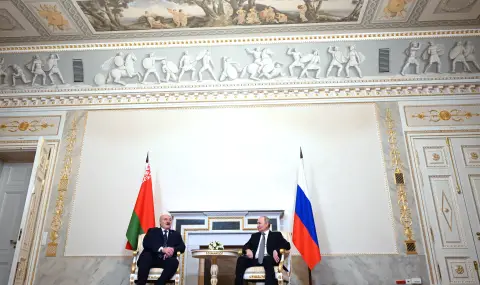Belarus army joins second phase of Russian exercises ordered by president Vladimir Putin for exercising the deployment of tactical nuclear weapons, reports Reuters, quoted by News.bg.
The first phase of the exercises took place last month in southern Russia. According to nuclear analysts, this is a warning signal from Putin to dissuade the West from going deeper into the war in Ukraine.
Belarusian Defense Minister Lieutenant General Viktor Hrenin said the exercises were a proactive measure to "increase our readiness to use the so-called retaliatory weapons".
"Now, more than ever, we are determined to respond to any threats to both our country and the Commonwealth" between Russia and Belarus, he emphasized.
He did not specify where the drills were taking place or what types of weapons were involved. Belarus borders three NATO countries - Poland, Lithuania and Latvia.
"We do not aim to create any tension on regional security issues. We do not project relevant military threats to third countries or to anyone else," Hrenin explained.
"We are a peaceful country, we do not threaten or seek confrontation with anyone, but we will keep our powder dry!", he pointed out.
Last year, Putin and Belarusian leader Alexander Lukashenko announced that Russia would deploy some of its tactical nuclear weapons to Belarus. These are warheads designed for use on the battlefield, as opposed to long-range strategic weapons designed to destroy entire enemy cities.
Some Western analysts believe that tactical nuclear weapons have become more important in Moscow's thinking since the start of the war in Ukraine, where its conventional forces fought for the first two years.
In theory, the use of such a weapon could be a stunning shock to the West without necessarily triggering a full-scale nuclear war, although the risk of triggering a cycle of escalation would be enormous. From the first day of the war, Putin has repeatedly warned the West about the size and power of Russia's nuclear arsenal.
The first phase of the exercises took place last month in the Akhtubin region in southern Russia and included Iskander missiles. and "Dagger".
Last month, the Russian Foreign Ministry expressed hope the exercises would "cool down hot heads in Western capitals", after French President Emmanuel Macron floated the possibility of sending European troops to fight Moscow in Ukraine. and British Foreign Secretary David Cameron announced that Kiev has the right to use weapons provided by London to strike targets in Russia.
